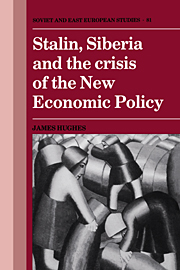Book contents
- Frontmatter
- Contents
- List of tables
- Preface
- Note on transliteration and dates; weights and measures
- Map of Siberia in 1928
- Introduction
- 1 The Siberian peasant utopia
- 2 The party and the peasantry
- 3 Who was the Siberian kulak?
- 4 The crisis of NEP
- 5 The end of NEP
- 6 The emergency measures
- 7 The ‘Irkutsk affair’
- Conclusion
- Appendix
- Glossary
- Notes
- Bibliography
- Index
- Book List
- Frontmatter
- Contents
- List of tables
- Preface
- Note on transliteration and dates; weights and measures
- Map of Siberia in 1928
- Introduction
- 1 The Siberian peasant utopia
- 2 The party and the peasantry
- 3 Who was the Siberian kulak?
- 4 The crisis of NEP
- 5 The end of NEP
- 6 The emergency measures
- 7 The ‘Irkutsk affair’
- Conclusion
- Appendix
- Glossary
- Notes
- Bibliography
- Index
- Book List
Summary
Moscow's response to the grain crisis
The indications are that even as late as mid-December 1927 the central authorities were still unaware of the full extent of the grain crisis. The Politburo was absorbed by the struggle with the Left and polemics on the launch of the new party slogan of a ‘reinforced offensive’ on the kulak, which aimed to take the venom out of attacks by Zinoviev, Trotsky and other Oppositionists on the supposedly ‘prokulak’ policy of the leadership. While the Left cited the fall-off in the grain procurements as a vindication of their stance, leading party and state officials complacently played down the scale of the difficulties, characterising them as a transitory phenomenon. At the Fifteenth Congress (2–19 December) the looming crisis went almost completely unnoticed as it was overshadowed by the main business of the expulsion of the Left.
Only Mikoyan, Head of Narkomtorg USSR, and Rykov addressed themselves directly to the unsatisfactory state of grain procurement and they cited the price imbalances and shortages of manufactured goods in the countryside as the main reason for the difficulties. Mikoyan referred to the effect of the war scare on peasant hoarding and argued for the resolution of the problem ‘in the most painless way’, by transferring goods from the towns to the countryside even at the cost of ‘a temporary (for a few months) denuding of the town markets’. He also called for a new sowing campaign to raise grain production: a proposal that was reminiscent of famine-relief measures taken by the Bolsheviks during the civil war.
- Type
- Chapter
- Information
- Stalin, Siberia and the Crisis of the New Economic Policy , pp. 123 - 148Publisher: Cambridge University PressPrint publication year: 1991



